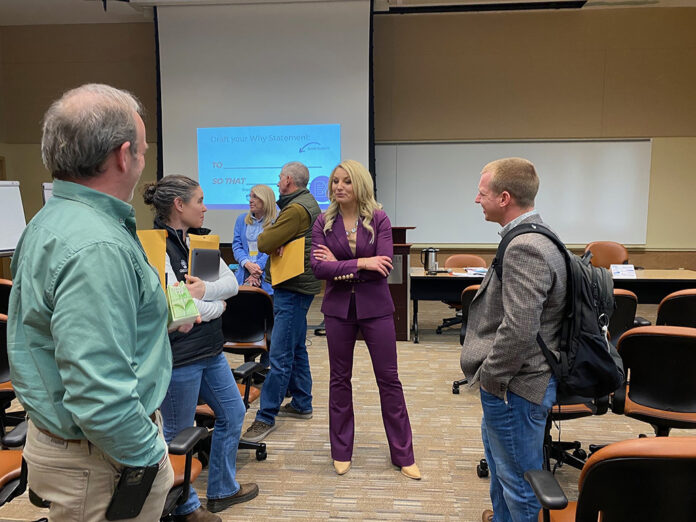
STATE COLLEGE, Pa. — On February 5, nearly 400 producers and agribusiness representatives gathered at the annual Pennsylvania Dairy Summit held at the Penn Stater Hotel and Conference Center. The central theme of the event revolved around a thought-provoking question: “What is your why?”
Peggy Coffeen, the founder and host of the Uplevel Dairy Podcast, addressed this topic with vigor. Drawing inspiration from Simon Sinek’s influential book, “Start With Why,” Coffeen emphasized that understanding one’s purpose can help overcome obstacles and inspire action. She has spent the past 15 years engaging with dairy farmers across the nation, sharing their stories and challenges.
Coffeen observed that as dairy businesses expand, owners and managers often face difficulties in transitioning from the technical aspects of managing cattle to the broader scope of managing people and operations. She articulated that the influence a dairy farmer has on their family and community is not merely a result of their actions but fundamentally rooted in their motivations and core beliefs.
Personal Insights and Experiences
Having grown up on a dairy farm herself, Coffeen drew from her personal experiences to illustrate the importance of having a “why.” She recounted a memorable incident at the age of 17 when she found herself stuck in a challenging field, maneuvering an Allis-Chalmers 6080 tractor. This moment of feeling trapped resonated with her audience, prompting reflections on their own struggles and the significance of their motivations during tough times.
“It’s the love of what you do that gets you out of bed,” Coffeen remarked, underscoring that the “why” transcends monetary gains, profitability, or familial ties. Instead, it is the sense of purpose that guides daily decision-making. She emphasized the need for loyalty to be built on inspiration rather than manipulation, asserting that inspiring those around you is crucial for success in any venture.
Communicating this “why” effectively to family members and employees is vital for ensuring the longevity of the operation and facilitating smooth transitions during significant family events. “Inspire those around you to take action,” Coffeen urged, highlighting that fostering a shared understanding of one’s motivations can enhance the perceived value of farmers within their communities.
Articulating Your “Why”
Coffeen elaborated that discovering one’s “why” is rooted in both purpose and passion. This intrinsic motivation serves as a continuous source of inspiration and drives the essence of a dairy operation. It becomes clear why a farm exists and why it matters to the community.
“Few things are as emotional as family farms,” she noted, reflecting on the goals passed down through generations. For instance, at her family farm, Al-ICKX Holstein Farm in Monticello, Wisconsin, the guiding principle is to “protect a legacy so that future generations can have opportunities to farm.”
Coffeen has encountered various interpretations of “why” across different family farms. For example, at Brey Family Beef in Door County, Wisconsin, the mission is “to learn and adapt so that all may have a quality of life.” In Waterville, Iowa, Rolinda Dairy aims “to give others an opportunity they may not have otherwise had so that all can be successful.”
Other farmers shared their motivations, such as Omar Guerrero of Drake Dairy, who expressed that his “why” is “to show his wife the American dream so that others may see what’s possible for themselves.” Such narratives highlight the profound impact of understanding and articulating one’s purpose in agricultural endeavors.
Engaging in Meaningful Conversations
During the summit, Dr. Brian Reed, a dairy transition and transformation consultant from Manheim, facilitated a workshop titled “Finding Fairness in Farm Transitions: Is it Fair? Should it be?” He emphasized the necessity of engaging in deep discussions regarding fairness in succession planning.
“Rarely is equal fair, and vice-versa. It’s complicated,” Reed stated, pointing out the complexities involved in farm transitions.
Strategic planning is essential for successful transitions, allowing families to assess their current standing, future goals, and actionable steps to achieve them. Reed encouraged participants to envision where they see their operation in 30 to 40 years, considering factors such as special-needs family members and long-term care for aging relatives.
“If you’re not getting along with your sibling, why go into business with them?” he questioned, urging families to consider the dynamics among all members involved.
Reed advocated for open communication among stakeholders to review plans, goals, concerns, and the overall vision for the farm. He noted the potential value of outside advisers and facilitators to assist in navigating these discussions. Ultimately, he suggested that a family meeting led by the senior generation could help clarify the plan and articulate why it is considered fair.
Through these discussions, families can address pressing issues surrounding succession planning, especially in light of rising farmland prices, which have escalated significantly over the decades. According to the American Farm Bureau, the average price per acre of farmland in the U.S. rose from $1,270 in 1997 to $5,570 in 2024, highlighting the financial complexities families face as they plan for the future.
“These questions need answers down the road,” Reed concluded, emphasizing the importance of proactive discussions in ensuring a smooth transition for family farms.




